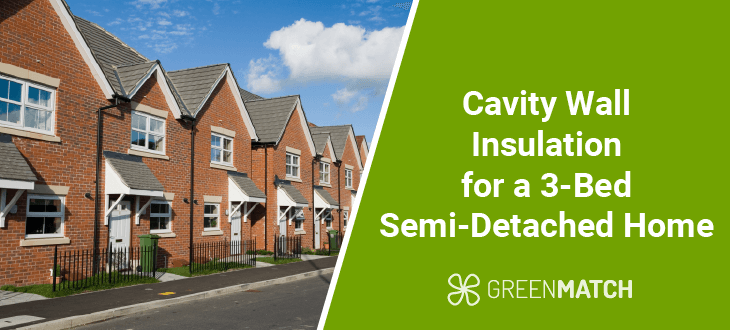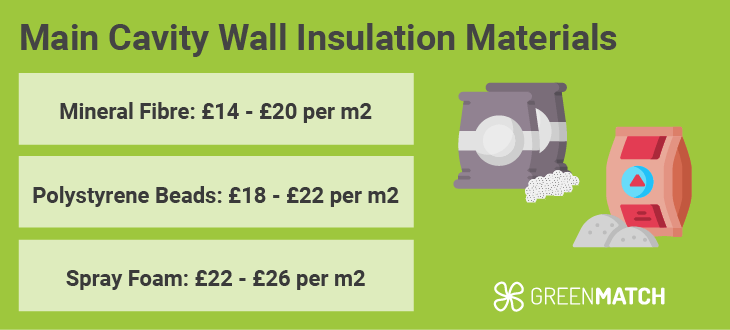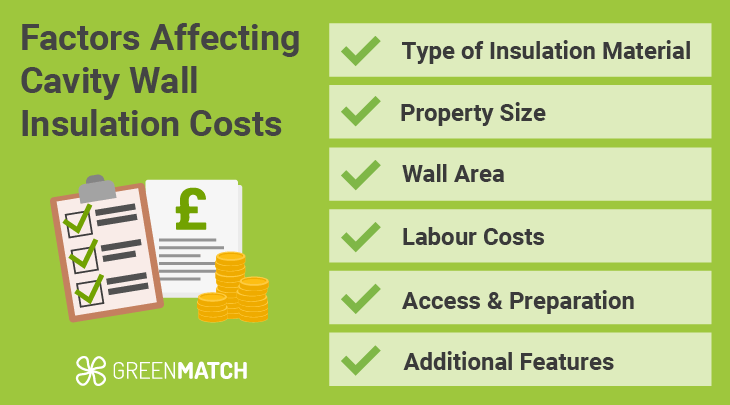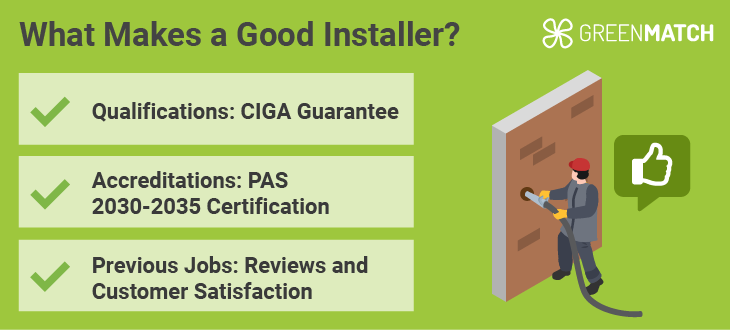Answer these simple questions and we will find you the BEST prices
Which type of solar quotes do you need?
It only takes 30 seconds
100% free with no obligation

Get Free quotes from insulation specialists near you

Save money by comparing quotes and choosing the most competitive offer

The service is 100% free and with no obligation
- GreenMatch
- Insulation
- Wall Insulation
- Cavity Wall Insulation
- Cavity Wall Costs For 3 Bed Semi
How Much Does Cavity Wall Insulation Cost in a 3-Bed Semi?


- More than three-quarters of all UK properties have cavity walls.
- Cavity wall insulation for a standard semi-detached home costs around £2700.
- Cavity wall insulation can save a semi-detached home up to £235 in annual energy bills.
Cavity walls are a popular build type that took the UK by storm after the 1920s. Made up of two wall leaves with a cavity space in between, these walls help reduce inner moisture by separating the inner wall of a home from its outer wall.
While a great building upgrade, the Department for Energy Security & Net Zero estimates that up to 29% of these homes have no cavity wall insulation in place. This makes up about 6.1 million homes with soaring energy bills, damp home environments and huge carbon footprints.
This GreenMatch UK guide will provide everything you need to install your semi-detached home with cavity wall insulation. Complete with general costs, savings, and additional price-influencing factors, read on to learn more about why cavity wall insulation is important.
Eager to get started? Look no further than GreenMatch UK to be your one-stop solution for finding the perfect installer! Instead of spending countless hours surfing websites and scheduling phone calls, just spend 30 seconds filling out our simple online form and receive up to 3 free home tailor quotes. Click below to begin and find the best bargain for your home!
- Describe your needs
- Get free quotes
- Choose the best offer
It only takes 30 seconds



How much is cavity wall insulation for a 3-bed semi?
Cavity wall insulation for a 3-bedroom semi-detached home costs around £2700, however, this investment can fluctuate depending on factors such as your chosen insulation material, wall condition, location, and installation complexity.
For example, if your cavity walls have preexisting insulation in place that needs removing, this can be an extra cost on top of the base job. Any wall cracks, crevices and damage that has been unattended will also need mending before cavity wall insulation.
Costs per type of material

The three most popular types of cavity wall insulation on the market are mineral fibres, polystyrene beads, and spray foam insulation. Each comes with its own price range, pros, cons, and insulation capacity.
Here’s a breakdown of what to expect per material:
- Mineral fibre: Costing around £14 – £20 per m2, mineral fibre insulation is considered the most popular and budget-friendly form of cavity wall insulation. Made mostly from recycled materials, mineral fibre is easy to produce, relatively sustainable, and effective enough in retaining heat.
- Polystyrene beads: Priced around £18 - £22 per m2, polystyrene beads are quickly becoming a popular cavity wall insulator due to their moisture and mould resistance. These small beads are injected into the cavity space, expanding to fill the gaps whilst still leaving space for ventilation.
- Spray foam: With a heftier price tag of £22 - £26 per m2, cavity spray foam insulation is one of the most effective insulation materials for heat retention. Usually found in the form of polyurethane foam, this expanding material expands to create an airtight seal of the cavity space. Unfortunately, spray foam is also completely unrecyclable, and risks off-gassing harmful toxins and VOCs during and after installation.
While mineral fibre might be the cheapest insulator, and spray foam might be the most effective, polystyrene beads emerge as the most cost-effective material on the market these days. With its impressive heat retention, resistance to moisture and mould, as well as a decent price tag, it provides the best balance of price and performance.
What factors affect the cost of cavity wall insulation for a 3-bed semi?

Despite costing an average of £2700, your total investment for cavity wall insulation can fluctuate depending on a series of factors. Some of these main factors include your chosen insulation material, home size, total wall area, as well as additional preparation costs, repairs, and home features you may want.
In this section, we’ve summarised what you could expect for each factor, as well as how it may affect your overall cavity wall insulation cost.
Type of insulation material
With the various cavity wall insulation types available on the market, your choice will come with its price tag. On the cheaper end, mineral fibre tends to be the most budget-friendly option available, whereas spray foam insulation is the most expensive, yet effective.
The most ideal cost-to-performance ratio is seen in polystyrene beads. Their relatively affordable price range, balanced with impressive heat retention and features like moisture and mould resistance make it a perfect choice for cavity walls.
Additionally, polystyrene beads are relatively recyclable, allowing for older insulation material to be reduced into granules and remade into new products.
Property size and wall area
A typical 3-bedroom semi-detached UK house has a floorplan of around 1033 square feet (96 m2), but variations of this standard floorplan can be found.
As a general rule of thumb, the larger your property and the more wall area it has, the more you could expect to pay for cavity wall insulation.
Additionally, homes with add-ons (conservatories, orangeries) may require extra scaffolding which is often not mentioned in cavity wall insulation quote prices. Scaffolding can cost an extra £300 or so to hire, excluding setup and takedown costs calculated by the installer.
Labour costs
In general, labourers charge around £15 - £20 per hour of installation work, but this price can depend on your region, city, and even neighbourhood. For example, if you live in central London, you could expect to pay more for labour costs than you would in a village.
Installation complexity
Your location and installation complexity will play a role in your overall costs. For example, if you are in a dense packed neighbourhood where the cavity wall insulation job would be more complex, labour costs may be higher than if you live in a sparse neighbourhood.
Installers may also come across existing issues and outdated repairs that need to be addressed before cavity wall insulation can be installed. The most typical issues faced are damaged brick facades (gaps and cracks), relocating of wires, outdated insulation, and poor sealing, all of which can compromise the effectiveness of your insulation if left unresolved.
Additional features
Alongside repairs, additional features might be needed to enhance your cavity wall insulation. While not always required, it’s always worth considering to prolong your insulation lifespan.
A common problem with cavity wall insulation is the blockage of air circulation. An installer may need to improve ventilation to ensure your insulation doesn’t collect moisture and mould.
Certain other products - like masonry protection cream - can help make sure that your outer wall facade is properly reinforced against weather elements, helping protect the insulation within.
Get multiple cavity wall insulation quotes for a 3-bed semi-detached home

Deciding to insulate your cavity walls is a great step, but it’s only the beginning of the road! The real work starts with trying to find the perfect installer for the job. There are a few important indicators you can look at to make sure you pick the right fit:
- Qualifications: Look for installers that are CIGA certified. The Cavity Insulation Guarantee Agency (CIGA) is an independent agency that reviews installers to ensure professionalism, even providing up to 25 years guarantee on CIGA installer jobs.
- Accreditations: Installers that are accredited by the PAS 2030-2035 regulations are most likely to deliver a professional insulation job. The Publicly Available Specifications (PAS) are a series of government-approved regulations that ensure installers meet the required installation standards. If you plan to benefit from a grant scheme, you are required to work with a PAS-accredited contractor.
- Previous jobs: By checking previous client reviews, and even visiting past jobs, you can form a good understanding of an installer's professionalism and satisfaction rate. Doing so can help you avoid any surprises when it’s your turn for an insulation job.
It’s also important to not settle for the first quote price you receive! To get the best picture of bargains you could land, make sure to compare multiple quotes from a range of installers in your area. However, this may be easier said than done as not everyone has countless hours to spend on stressful research and vetting. That’s where GreenMatch UK can help you out.
Through our nationwide network of trusted professional installers, GreenMatch UK can connect you with the best deal for your home. Instead of spending endless hours on the web and phone calls, spare 30 seconds to fill out our online form and receive up to 3 free home-tailored quotes. The best part? Our services are entirely free and without obligations. Click below to begin!
- Describe your needs
- Get free quotes
- Choose the best offer
It only takes 30 seconds



FAQ
A 3-bedroom semi-detached house can expect to pay up to £2700 for a cavity wall insulation job. However, this price can fluctuate depending on your circumstances, such as home size, chosen insulation material, home accessibility, and outdated repairs.
The cheapest way to insulate cavity walls would be to use mineral fibre as an insulation material. Costing around £14 – £20 per m2, mineral fibre is a popular and easy-to-find insulation material that is made mostly from recycled materials. It’s blown into the cavity space through specialist equipment and requires proper wall sealing to keep free of moisture.

Akif is a copywriter at GreenMatch since 2023. With a keen interest in community sustainability, green solutions and the role of digital media in identifying climate trends, he aims to hone in on his background in International Studies and Digital Media to provide a multidisciplinary approach to written content rooted in credible research and accuracy.
We strive to connect our customers with the right product and supplier. Would you like to be part of GreenMatch?

